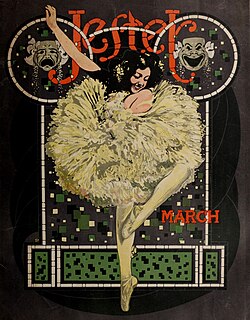Related Research Articles

A lightbulb joke is a joke cycle that asks how many people of a certain group are needed to change, replace, or screw in a light bulb. Generally, the punch line answer highlights a stereotype of the target group. There are numerous versions of the lightbulb joke satirizing a wide range of cultures, beliefs and occupations.

A jester, court jester, fool or joker was a member of the household of a nobleman or a monarch employed to entertain guests during the medieval and Renaissance eras. Jesters were also itinerant performers who entertained common folk at fairs and town markets, and the discipline continues into the modern day, where jesters perform at historical-themed events.

Lin Yutang was a Chinese inventor, linguist, novelist, philosopher, and translator. His informal but polished style in both Chinese and English made him one of the most influential writers of his generation, and his compilations and translations of classic Chinese texts into English were bestsellers in the West.

The Story of Little Black Sambo is a children's book written and illustrated by Scottish author Helen Bannerman and published by Grant Richards in October 1899. As one in a series of small-format books called The Dumpy Books for Children, the story was popular for more than half a century.
Jonathan Dermot Spence was an English-born American historian, sinologist, and writer specialising in Chinese history. He was Sterling Professor of History at Yale University from 1993 to 2008. His most widely read book is The Search for Modern China, a survey of the last several hundred years of Chinese history based on his popular course at Yale. A prolific author, reviewer, and essayist, he published more than a dozen books on China. Spence's major interest was modern China, especially the Qing dynasty, and relations between China and the West. Spence frequently used biographies to examine cultural and political history. Another common theme is the efforts of both Westerners and Chinese "to change China", and how such efforts were frustrated.
Many colleges and universities publish satirical journals conventionally referred to as "humor magazines."

Annalee Newitz is an American journalist, editor, and author of both fiction and nonfiction, who has written for the periodicals Popular Science and Wired. From 1999 to 2008 Newitz wrote a syndicated weekly column called Techsploitation, and from 2000 to 2004 was the culture editor of the San Francisco Bay Guardian. In 2004 Newitz became a policy analyst at the Electronic Frontier Foundation. With Charlie Jane Anders, they also co-founded Other magazine, a periodical that ran from 2002 to 2007. From 2008 to 2015 Newitz was Editor-in-Chief of Gawker-owned media venture io9, and subsequently its direct descendant Gizmodo, Gawker's design and technology blog. As of 2019, Newitz is a contributing opinion writer at The New York Times.
"The normalization principle means making available to all people with disabilities patterns of life and conditions of everyday living which are as close as possible to the regular circumstances and ways of life or society." Normalization is a rigorous theory of human services that can be applied to disability services. Normalization theory arose in the early 1970s, towards the end of the institutionalisation period in the US; it is one of the strongest and long lasting integration theories for people with severe disabilities.

Richie Unterberger is an American author and journalist whose focus is popular music and travel writing.
Mark Stephen Monmonier is a Distinguished Professor of Geography and the Environment at the Maxwell School of Citizenship and Public Affairs of Syracuse University. He specializes in toponymy, geography, and geographic information systems.

The Jester of Columbia, or simply the Jester, is a humor magazine at Columbia University in New York City. Founded on April Fool's Day, 1901, it is one of the oldest such publications in the United States. Printed continuously at least through 1997, it was revived in 2001 after a short lapse in publication and again in 2005 after another, shorter one. Jester now produces magazines and sponsors comedy events on Columbia's campus.
Athan George Theoharis was an American historian, professor of history at Marquette University in Milwaukee, Wisconsin. As well as his extensive teaching career, he was noteworthy as an expert on the Federal Bureau of Investigation (FBI), J. Edgar Hoover, and U.S. intelligence agencies, having written and edited many books on these and related subjects.
Robert James Thompson is an American educator and media scholar. He is the Trustee Professor of Television and Popular Culture at the S. I. Newhouse School of Public Communications at Syracuse University and founding director of the Bleier Center for Television and Popular Culture. He is widely quoted in media.
Seriousness is an attitude of gravity, solemnity, persistence, and earnestness toward something considered to be of importance. Some notable philosophers and commentators have criticised excessive seriousness, while others have praised it. Seriousness is often contrasted with comedy, as in the seriocomedy. In the theory of humor, one must have a sense of humor and a sense of seriousness to distinguish what is supposed to be taken literally or not, or of being important or not. Otherwise, it may also be contrasted with a sense of play. How children learn a sense of seriousness to form values and differentiate between the serious and that which is not is studied in developmental psychology and educational psychology. There is a distinction between the degree of seriousness of various crimes in sentencing under the law, and also in law enforcement. There is a positive correlation with the degree of seriousness of a crime and viewer ratings of news coverage. What is or is not considered serious varies widely with different cultures.
Kenneth Meyer Setton was an American historian and an expert on the history of medieval Europe, particularly the Crusades.
Gunnar Dybwad (1909–2001) was an American professor and advocate for the rights of people with disabilities, particularly developmental disabilities. He is best known for his support for the social model of disability, reframing disability accommodations as a matter of civil rights, not medical treatment. The American Association on Intellectual and Developmental Disabilities gives out the Dybwad Humanitarian Award annually in his honor.

Michael Bronski is an American academic and writer, best known for his 2011 book A Queer History of the United States. He has been involved with LGBT politics since 1969 as an activist and organizer. He has won numerous awards for LGBTQ activism and scholarship, including the prestigious Publishing Triangle's Bill Whitehead Award for Lifetime Achievement. Bronski is a Professor of Practice in Media and Activism at Harvard University.

"I'll Make a Man of You" is a World War I recruiting song that was sung across Britain in hopes of rallying young men to enlist in the military. It is sung from a flirtatious young woman's perspective of how she dates military men in order to turn them into better soldiers. It was written and composed by Arthur Wimperis and Herman Finck in 1914. The song was also showcased in Frank Lloyd's Cavalcade, and in the musical and film Oh, What a Lovely War!.
Cuffee, Cuffey, or Coffey is a first name and surname recorded in African-American culture, believed to be derived from the Akan language name Kofi, meaning "born on a Friday". This was noted as one of the most common male names of West African origin which was retained by some American slaves.
References
- 1 2 Profile at Boston University
- ↑ "Origin and History of April Fools' day" . Retrieved April 1, 2018.
- ↑ How a BU Prof April-Fooled the Country
- ↑ King Kugel: An April Fools’ history lesson
- ↑ Joseph Boskin. Corporal Boskin's Cold Cold War: A Comical Journey. Syracuse: Syracuse University Press, 2011. 224 pp. $24.95 (cloth), ISBN 978-0-8156-0964-3. Reviewed by Javan D. Frazier
- ↑ Robert G. O’Meally, "An Icon Through History"